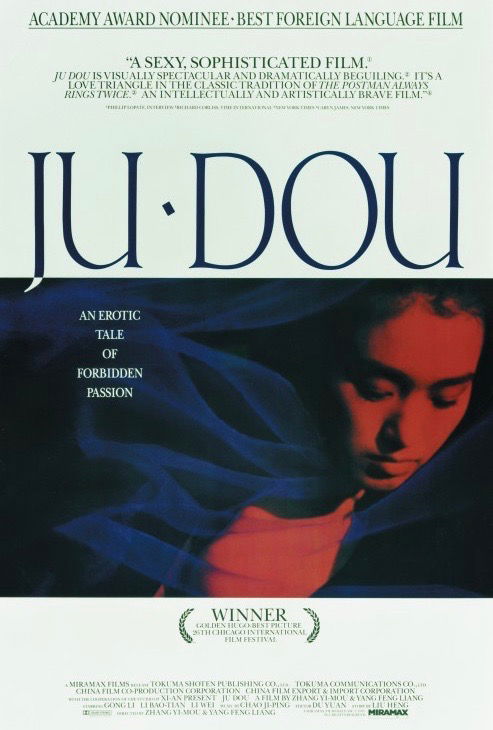
| None | Light | Moderate | Heavy | |
|---|---|---|---|---|
| Language | ||||
| Violence | ||||
| Sex | ||||
| Nudity |
Content:
(V, SS, AC) Very brief violence, on-going adultery, and ancestor worship according to Chinese custom.
More Detail:
The Chinese film JU DOU, with its adultery and illegitimacy, reveals powerful affinities with Hawthorne’s “The Scarlet Letter” and received high acclaim at the Cannes, Toronto and New York film festivals.
Set in a 1920’s northern China dye factory, this Oscar entry for best foreign-language film concerns a pair of lovers who have a passionate affair under the husband’s oblivious nose.
Uncle Yang’s latest purchase, Ju Dou, is wife number 3, but judging from her tortured nightly screams, it won’t be long before number 4 appears. Seems impotent Yang can’t produce the needed heir, so night after night he cruelly tortures his beautiful bride.
However, Yang’s adopted nephew also shows an interest in Ju Dou, and not only do the two engage in a sexual liaison, but before long, produce a male heir whom the old man thinks is his. Uncle Yang later suffers a partial paralysis that renders him nearly helpless and unable to walk. However, his resourceful nephew rigs up a kind of “roller bucket” in which he can maneuver. Though he now knows Tianbai is not his, the little boy calls him “Daddy.”
The lovers become very blatant in their relationship and torment the old man. One day, Tianbai plays with Yang in his roller bucket and innocently shoves him into a huge vat of dye where he drowns.
Seemingly, the lovers are home free. Not so, however. In fact, their retribution is just beginning as the village ancestors issue a decree following Yang’s death: the nephew must live away from the factory, and Ju Dou cannot remarry. To complicate matters, Tianbai has become a kind of monstrous “bad seed.” He angrily observes these two who have brought him such shame that the whole village snickers over them.
The lovers meet in a cave, the only place left for them, and nearly suffocate when Tianbai rescues them. In the end, Tianbai wreaks vengeance on the two who have destroyed his life.
JU DOU is a powerful, well-made film that bears mythic overtones. The dye factory setting, with streaming, colored banners, provides an ideal, symbolic setting for this non-violent tale of illicit love. The gorgeous cinematography also deserves kudos.
Despite the tender love story, the theme of illicit love cannot be easily dismissed. As the Lord told David following his sin of adultery: “Now therefore, the sword shall never depart from your house, because you have despised me” (2 Samuel 12:10).
Sin has consequences, and as the film shows, the lovers pay dearly for their sin. When is the last time a film was produced about adultery that denounced such actions? Truly, JU DOU affords a worthy example in this regard.
It should be noted that Communist China did not want this film shown in America, going so far as to even ask Hollywood to withdraw the film as an Oscar nomination. Thus, the story carries a symbolic message which condemns the evil of Communism and all the pain that it spawns.
Set in a 1920’s northern China dye factory, this Oscar entry for best foreign-language film concerns a pair of lovers who have a passionate affair under the husband’s oblivious nose.
Uncle Yang’s latest purchase, Ju Dou, is wife number 3, but judging from her tortured nightly screams, it won’t be long before number 4 appears. Seems impotent Yang can’t produce the needed heir, so night after night he cruelly tortures his beautiful bride.
However, Yang’s adopted nephew also shows an interest in Ju Dou, and not only do the two engage in a sexual liaison, but before long, produce a male heir whom the old man thinks is his. Uncle Yang later suffers a partial paralysis that renders him nearly helpless and unable to walk. However, his resourceful nephew rigs up a kind of “roller bucket” in which he can maneuver. Though he now knows Tianbai is not his, the little boy calls him “Daddy.”
The lovers become very blatant in their relationship and torment the old man. One day, Tianbai plays with Yang in his roller bucket and innocently shoves him into a huge vat of dye where he drowns.
Seemingly, the lovers are home free. Not so, however. In fact, their retribution is just beginning as the village ancestors issue a decree following Yang’s death: the nephew must live away from the factory, and Ju Dou cannot remarry. To complicate matters, Tianbai has become a kind of monstrous “bad seed.” He angrily observes these two who have brought him such shame that the whole village snickers over them.
The lovers meet in a cave, the only place left for them, and nearly suffocate when Tianbai rescues them. In the end, Tianbai wreaks vengeance on the two who have destroyed his life.
JU DOU is a powerful, well-made film that bears mythic overtones. The dye factory setting, with streaming, colored banners, provides an ideal, symbolic setting for this non-violent tale of illicit love. The gorgeous cinematography also deserves kudos.
Despite the tender love story, the theme of illicit love cannot be easily dismissed. As the Lord told David following his sin of adultery: “Now therefore, the sword shall never depart from your house, because you have despised me” (2 Samuel 12:10).
Sin has consequences, and as the film shows, the lovers pay dearly for their sin. When is the last time a film was produced about adultery that denounced such actions? Truly, JU DOU affords a worthy example in this regard.
It should be noted that Communist China did not want this film shown in America, going so far as to even ask Hollywood to withdraw the film as an Oscar nomination. Thus, the story carries a symbolic message which condemns the evil of Communism and all the pain that it spawns.


 - Content:
- Content: 


